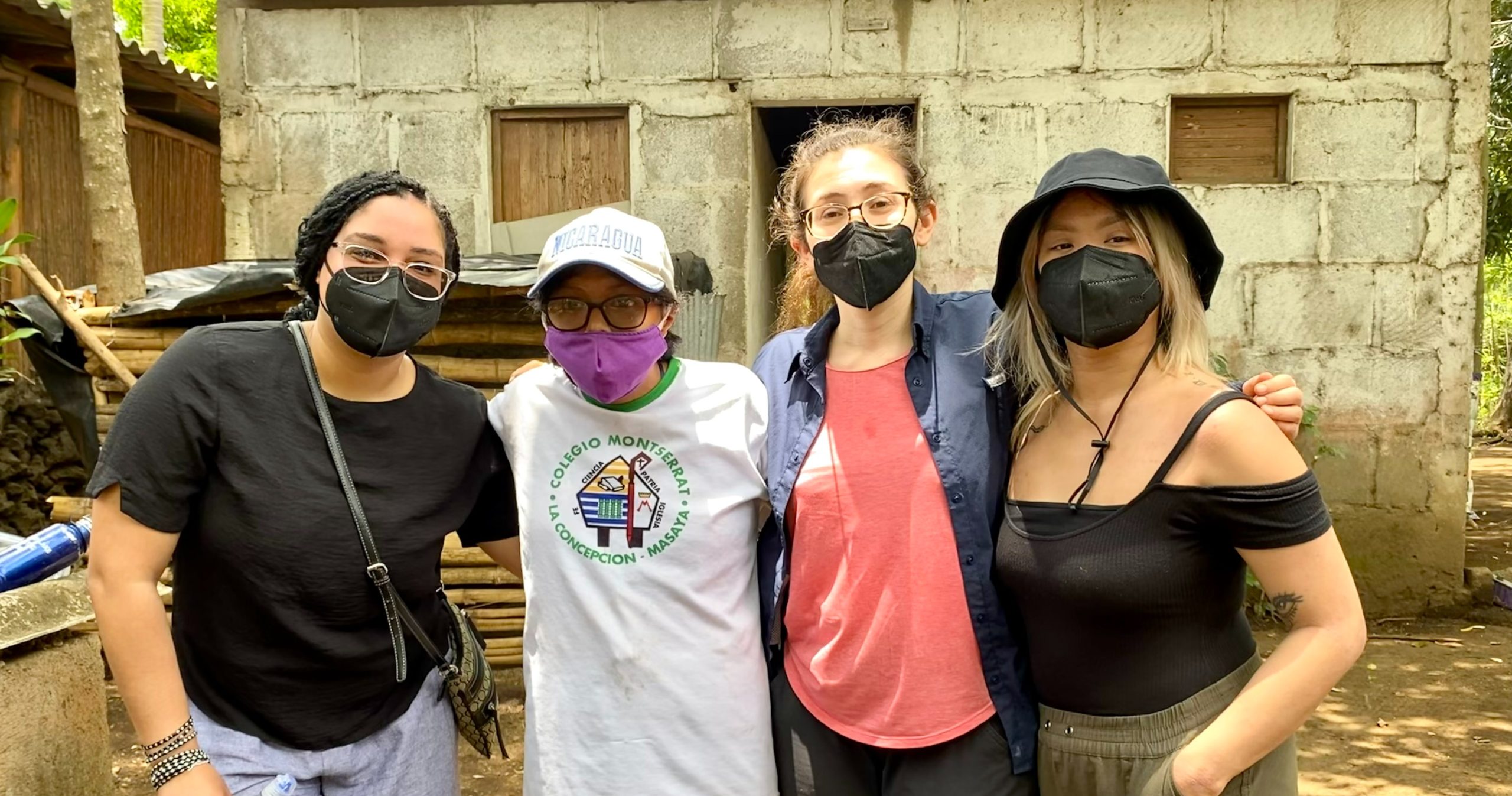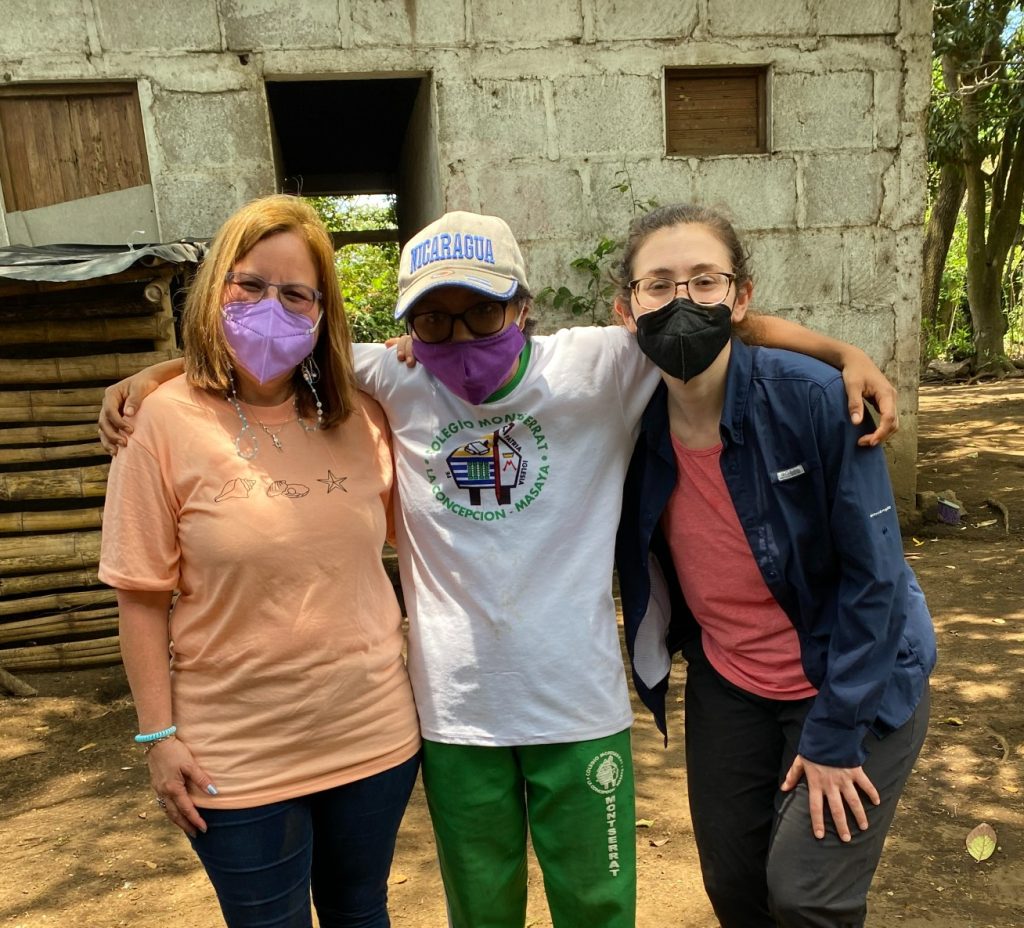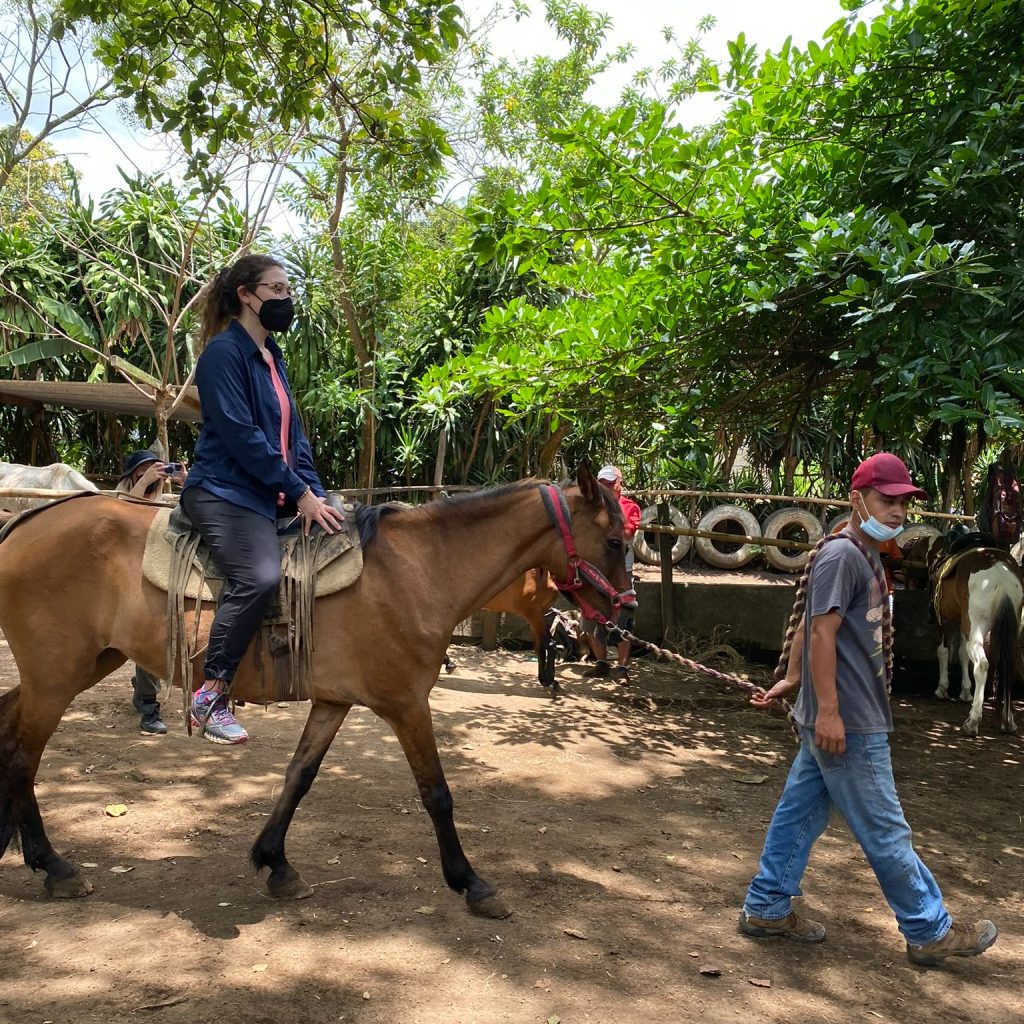Wednesday, July 13, 2022

by Lauren Glaser (BUSSW MSW ’23)
This past academic year, I worked as a global health research assistant at the Center for Innovation in Social Work & Health (CISWH) under the supervision of Professor Dr. Luz López. In this role, I helped prepare and deliver mental health trainings to university students in Nicaragua via Zoom. Following that, I was privileged to be one of two BUSSW MSW students who took part in CISWH’s trip to Nicaragua in April 2022, where I got to meet in person with many of the university students I had worked with virtually.
Our initial delegation of four — Professor López, CISWH Executive Director Ellie Zambrano, CISWH Administrative Assistant Winnie Chen, and me (the second MSW student, Madelyn Fermin, joined midway through the trip) — flew from Boston to Miami to Managua. Upon landing we left the airport and walked into the warm, sticky Nicaraguan weather that felt quite familiar to me, having worked there for several months before I began my MSW studies.
We hopped into a pickup truck and, after stopping for our first of many delicious meals, we headed north to the small city of Estelí, where two of our partners, Fundación Superemos and the National Autonomous University of Nicaragua-Estelí (UNAN-FAREM Estelí), are located.
The Superemos Foundation and Boston University have a truly special relationship that has lasted more than two decades. The relationship began with an annual medical brigade led by Dr. Peter Loewinthan, which now includes BU-affiliated dentists, doctors, nurses, psychologists, and social workers. The group travels to Estelí to deliver healthcare to people in the surrounding areas and to train local providers. This year the training was offered via Zoom due to the pandemic. One of the goals for our visit to Superemos was to provide follow-up in-person trainings for students and professionals, including nurses, physicians, and lawyers working in rural healthcare and domestic violence prevention.

On our first morning, after breakfast at a family-run B&B, we taxied over to the Superemos site, an oasis of green at the edge of town. The property is tidy with mural-covered buildings where art classes, high school equivalency courses, and other training programs take place. When we got to Superemos that first day, we were greeted with open arms and hearts by Stephen Stefton, who is one of the original founders of the organization and their Intervention, Change, and Education Service (ICES) team. After an introduction to the organization and a tour of the facilities, we shared a delicious homemade lunch of rice, fresh vegetables, and avocado in the outdoor dining area.
ICES is one of the central programs of Superemos. Created in 2010, it works to address domestic violence in and around Estelí, and utilizes a wraparound team including a lawyer, psychologist, and social worker to support victims of domestic violence and their families. The team travels regularly to rural areas offering prevention education and interactive seminars about unhealthy relationships, and to establish trusting relationships with residents.
The three women who make up the ICES team—Maria Félix Castillo, Karen Villareyna, and Sindy Alvarado—led us through a comprehensive and meaningful program during the first few days of our visit. Some of the moments that stick out in my mind include traveling for hours to get to a rural health outpost, where the ICES team delivered a presentation to a group of moms while their children were vaccinated; a meeting at the Ministry of Family, Adolescence; a meeting at the UNAN-FAREM, university in Estelí, with faculty and administrators we had met during the Zoom trainings earlier in the year; and a visit to a shelter for at-risk pregnant women that Superemos helps run, where we engaged with the soon-to-be mothers. It was heartening for me as a new social worker to see how the ICES team engaged with the women at the shelter in such a dynamic, authentic, and non-hierarchical way.
The three women who make up ICES went above and beyond to make sure that we felt welcome and supported. For example, when I came down with a stomach illness, they made a trip to the pharmacy for me without being asked, and then sent me WhatsApp messages to check in on me. The ICES social worker, Sindy Alvarado Castro, showed me great patience when I peppered her with questions about why she became a social worker, about social work education in Nicaragua, and the social work profession overall. I learned the ins and outs of the thesis that Sindy co-wrote on rural healthcare delivery, and about what it’s like to be a part of a profession that many Nicaraguans don’t quite understand yet. Towards the end of the week when we had to say goodbye to Superemos and to the ICES team, it was with heavy hearts and much gratitude for both the professional and personal connections we had experienced in Estelí.
 Next, we traveled back down towards Managua to learn about La Mariposa, an NGO founded by former social worker Paulette Goudge, an Englishwoman who moved to Nicaragua years ago. The initial idea for La Mariposa was that it would be an eco-hostel and Spanish school to help spur local employment. With Paulette’s energy and passion, however, it transformed into something even bigger. Over the course of a few days we had the chance to visit the projects that La Mariposa funds and runs. These include free physical, mental health, and equine therapy for children with special needs; clean water delivery for a village that doesn’t have access to running water; a reforestation project; an animal sanctuary; a small English school for local children, and more. Just like in Estelí, we were received by people—Paulette herself, her employees, community members, and clients—who patiently shared their stories with us without expectation of anything in return.
Next, we traveled back down towards Managua to learn about La Mariposa, an NGO founded by former social worker Paulette Goudge, an Englishwoman who moved to Nicaragua years ago. The initial idea for La Mariposa was that it would be an eco-hostel and Spanish school to help spur local employment. With Paulette’s energy and passion, however, it transformed into something even bigger. Over the course of a few days we had the chance to visit the projects that La Mariposa funds and runs. These include free physical, mental health, and equine therapy for children with special needs; clean water delivery for a village that doesn’t have access to running water; a reforestation project; an animal sanctuary; a small English school for local children, and more. Just like in Estelí, we were received by people—Paulette herself, her employees, community members, and clients—who patiently shared their stories with us without expectation of anything in return.
Before the trip, I was honestly a bit nervous to participate since the journey was to take place right in the middle of my MSW program’s final exams and papers. It turns out that my concerns were unnecessary. I was even able to use what I had learned from the ICES team as inspiration for my final Communities and Organizations course assignment.
What I gained from the trip to Nicaragua was immeasurable. Much more than professional experience, I gained several new friends and a deep appreciation for the work other women are carrying out across borders. I was, and continue to be, inspired and uplifted by the experience, and I remain grateful to Professor López, Ellie Zambrano, and everyone else at CISWH who made my participation in the trip possible.